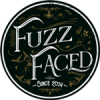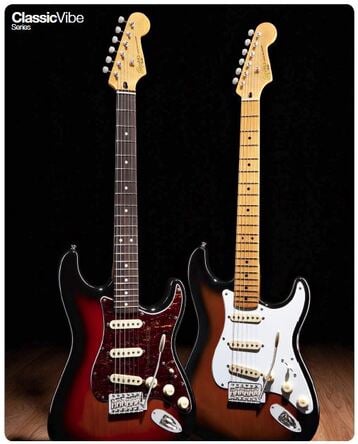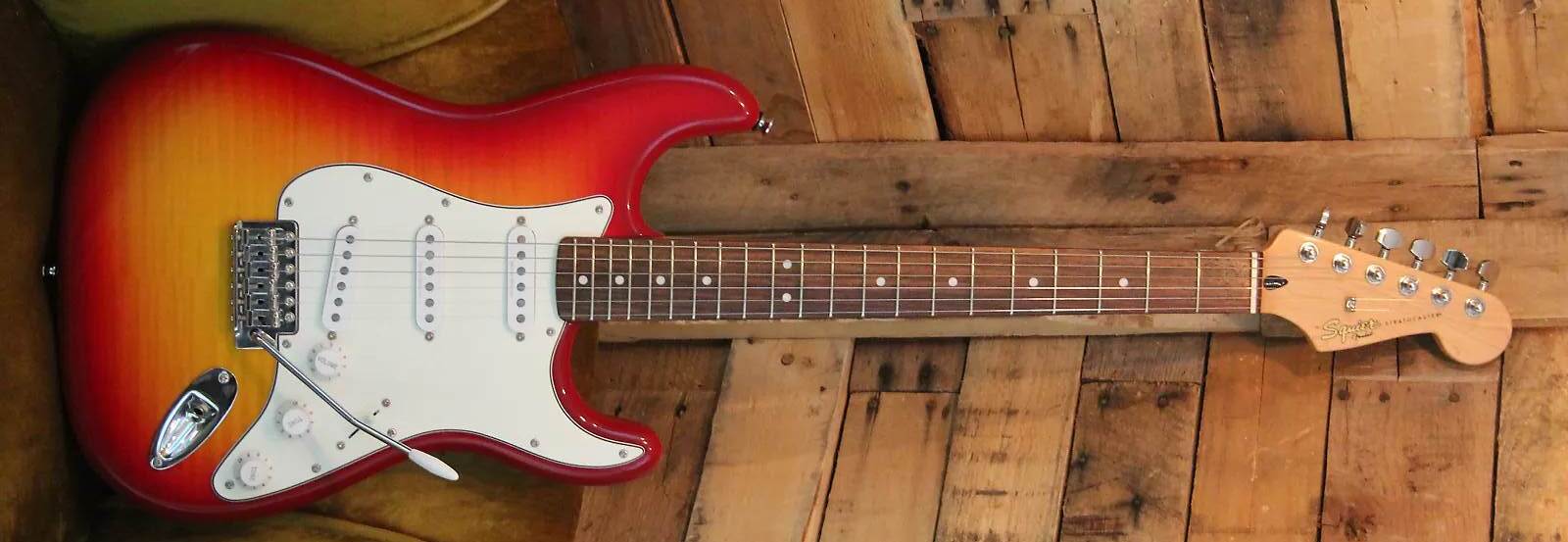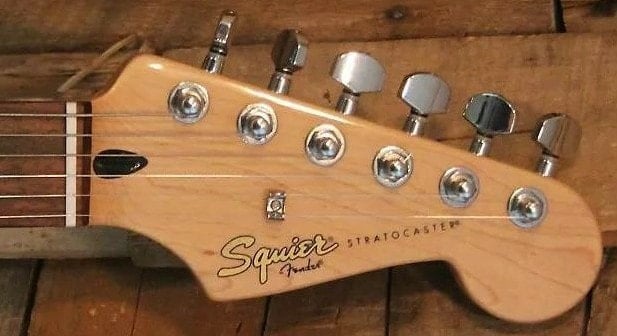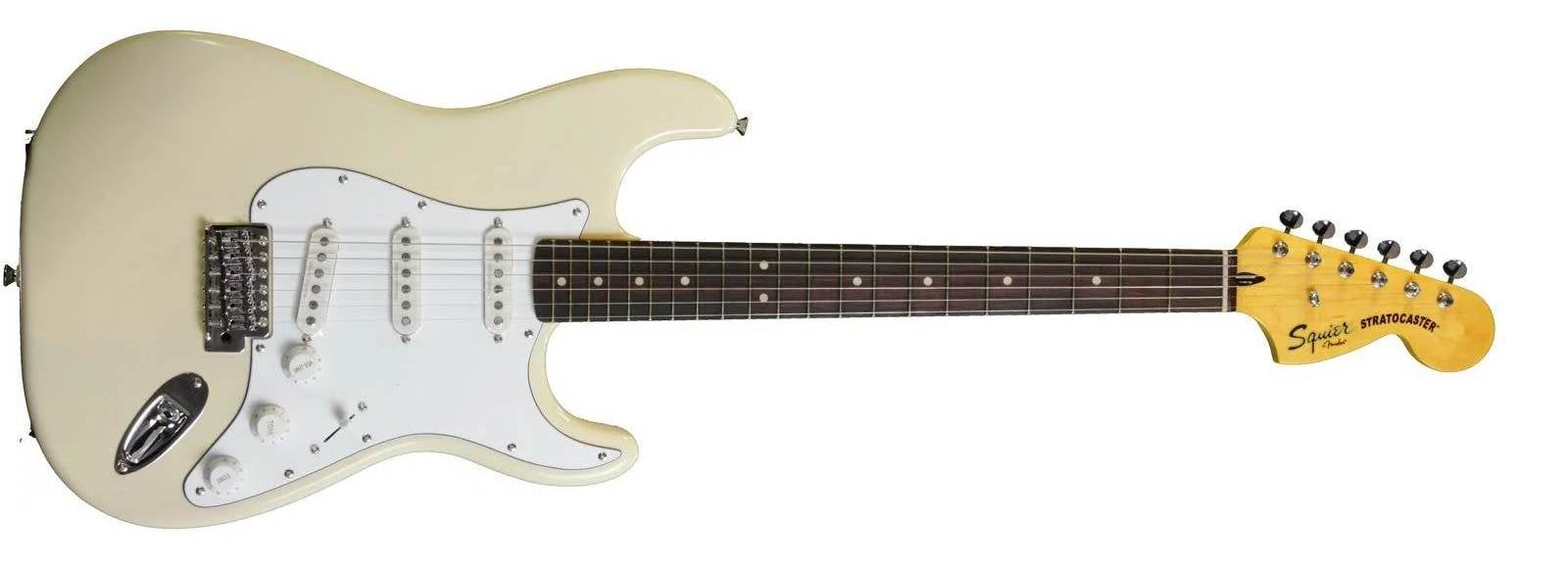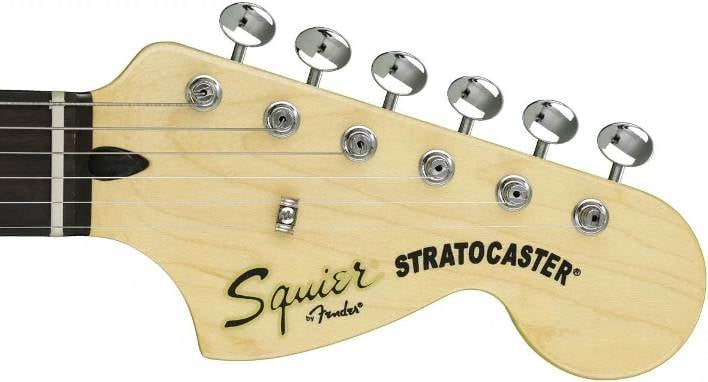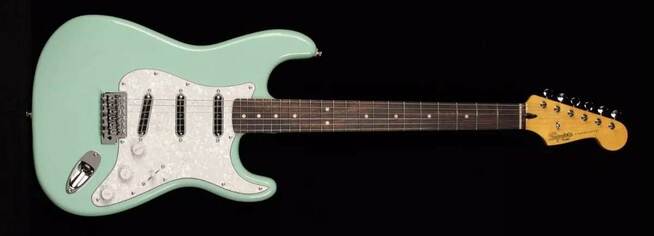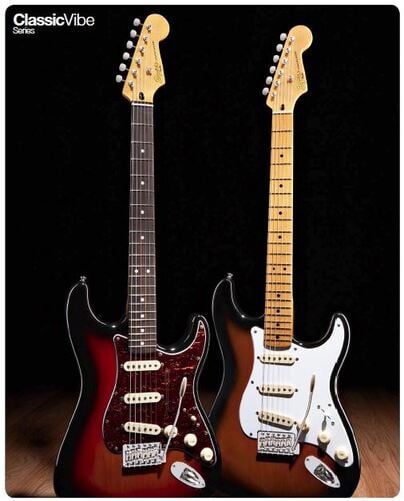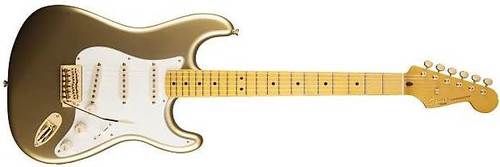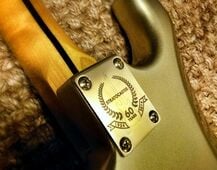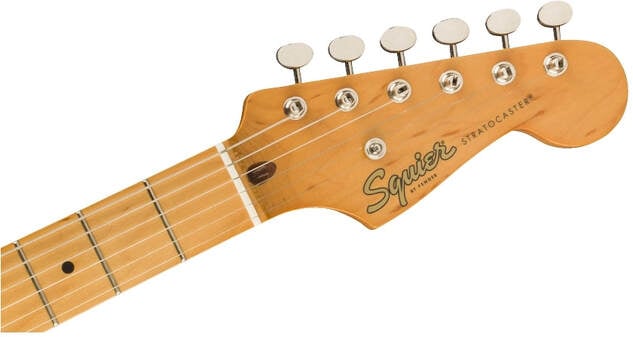Squier VINTAGE MODIFIED
The Vintage Modified Series had already appeared on the 2003 catalog with the Squier '51, but the first Stratocasters of this series were introduced only in the 2007 catalog. They were guitars made in India able to merge the Stratocaster’s classic design with small innovations with which guitarists often customized their instruments. As Fender declared: "The Vintage Modified Series is comprised of guitars that feature modern twists on classic design, built with popular modifications from the get-go." They had a vintage look but a “hot rodded" heart. Plus, they were low-priced.
In the first years of production it was possible to choose between two typologies of Vintage Modified Stratocasters, both in Indian red cedar: the Vintage Modified Strat, with three single coils in Alnico V Duncan Designed SC-101, and the Vintage Modified Strat HSS, equipped with two Stacked Coil Duncan Designed SC-102 pickups and with one Duncan Designed HB-112; both distinguished themselves from almost all the Squiers of the period by their small headstock with Gold Logo and the gloss neck.
In the first years of production it was possible to choose between two typologies of Vintage Modified Stratocasters, both in Indian red cedar: the Vintage Modified Strat, with three single coils in Alnico V Duncan Designed SC-101, and the Vintage Modified Strat HSS, equipped with two Stacked Coil Duncan Designed SC-102 pickups and with one Duncan Designed HB-112; both distinguished themselves from almost all the Squiers of the period by their small headstock with Gold Logo and the gloss neck.
In 2012, with the new Vintage Modified Stratocaster and Vintage Modified Stratocaster HSS, production was moved to Indonesia and the series was updated both in its appearance, with the introduction of the big headstock (with Black Logo with golden contour) and new finishes, and in its essence, for the basswood body and the new humbucker for the HSS version, the Duncan Designed HB-102.
To these were added the Vintage Modified '70s Stratocaster and the Vintage Modified Surf Stratocaster: the first one was available in the “all-black” version, with black plastics and pickguard and maple fretboard, and in the Vintage White, with rosewood fretboard, white pickguard and black plastics, both equipped with big headstock, but strangely without bullet truss rod and the '70s style die-cast bridge, as you would expect from a guitar inspired by the CBS period; the second one distinguished itself by its small headstock, its lipstick style Duncan Designed LS-102 single coils and the white pearloid pickguard.
From 2018 on rosewood was replaced, due to the new CITES regulations on its use, by the Indian Laurel in the whole series.
Squier CLASSIC VIBE
The Classic Vibe series was introduced in 2008 by will of Chris Gill, who became the new Product Manager when Justin Norvell left Squier in 2005 to become Senior Marketing Manager for Fender, to “impart the vibe of classic Fender designs.” It was to be marketed in 2007, on the occasion of Squier’s 25th anniversary, but a chain of setbacks in the development phase delayed its launch by a year.
|
Classic Vibe Stratocasters were made in China in the Grand Reward factory and reproduced the Stratocasters of the ‘50s and ‘60s but did not bother too much with era-precise or vintage correct details.
The Classic Vibe '50s Stratocaster was presented in the Fender catalog as a guitar with the unmistakable tone of the '50s. At first available in the 2-Color Sunburst finish with tortoise shell pickguard, it had a sound reminiscent of the golden years of Fender: authentic, clear and brilliant, with an incredible sustain that was made possible by a set of Fender STA5 pickups in Alnico III custom staggered which provided a better balance of volume from string to string. The Classic Vibe '60s Stratocaster was reminiscent of the '60s strats with their full and strong attack tone, thanks to its set of Fender STA3 pickups in Alnico V custom staggered. At first, it was available in the 3-Color Sunburst with tortoise shell pickguard. |
Both models featured an alder body and a gloss maple neck with a modern 9.5”-radius fingerboard with 21 frets. The ‘60s model had a rosewood fretboard, replaced in 2018 by an Indian laurel one, while the ‘50s had a fretted maple neck.
There is a widespread belief that these guitars featured Tonerider pickups, but this is not entirely correct. Grand Reward factory also made pickups for Tonerider, but the Classic Vibe Stratocasters had their own pickups, although ‘50s Strat STA5 pickups were very similar to the Tonerider Surfari TRS5 set and the ‘60s Strat STA3 pickups were very similar to Tonerider Classic Blues TRS3 set.
The series was renewed many times during the years with new finishes and some limited editions, including, in 2013, the FSR '50s Candy Apple Red and '60s Lake Placid Blue, both with matching headstock, and with the addition of the left-handed in 2012.
There is a widespread belief that these guitars featured Tonerider pickups, but this is not entirely correct. Grand Reward factory also made pickups for Tonerider, but the Classic Vibe Stratocasters had their own pickups, although ‘50s Strat STA5 pickups were very similar to the Tonerider Surfari TRS5 set and the ‘60s Strat STA3 pickups were very similar to Tonerider Classic Blues TRS3 set.
The series was renewed many times during the years with new finishes and some limited editions, including, in 2013, the FSR '50s Candy Apple Red and '60s Lake Placid Blue, both with matching headstock, and with the addition of the left-handed in 2012.
In 2014 the series celebrated the 60th anniversary of the Stratocaster with the 60th Anniversary Classic Vibe ‘50s Stratocaster, available in Aztec Gold finish and featuring a commemorative neck plate.
Squier Classic Vibe, Second Series
In 2019 Classic Vibe Series was renewed and its production was moved to Indonesia because of the increase in production costs and taxes when importing from China.
Since Fender had problems getting their orders filled by Indonesian factories, they sent some orders for Classic Vibe models made between 2020 and 2021 to other factories in China. However, the new Chinese Classic Vibe Stratocasters were made to the same second series specs as if they were made in Indonesia.
The new Classic Vibe '70s Stratocaster, available both in the SSS and HSS models, was released, while the '50s and '60s strats were completely renewed. A new Squier Modern Logo appeared for the first time on these models: black on the ‘70s and gold on the others.
The first impression was that the new Classic Vibe was still an entry-level series but lower in quality than the previous Classic Vibe Series, despite the newly Fender Designed pickups in Alnico and the bridge with the double-stamped “SQUIER” saddles. Also, new woods were used for the body of these guitars, like nato (a.k.a. Nyatoh), soft maple, pine, and poplar.
Often referred to as ʽEastern Mahogany,’ nato offers similar looks and characteristics to mahogany, but it is a cheaper and lower quality wood due to its mechanical-acoustic characteristics. The fretboard was available in maple or Indian laurel, had a 9.5” radius, and was equipped with narrow-tall frets, while the neck had a “C” profile. Furthermore, the ‘50s model now featured a large circular string tree reminiscent of that used on the first ‘50s Stratocaster.
Since Fender had problems getting their orders filled by Indonesian factories, they sent some orders for Classic Vibe models made between 2020 and 2021 to other factories in China. However, the new Chinese Classic Vibe Stratocasters were made to the same second series specs as if they were made in Indonesia.
The new Classic Vibe '70s Stratocaster, available both in the SSS and HSS models, was released, while the '50s and '60s strats were completely renewed. A new Squier Modern Logo appeared for the first time on these models: black on the ‘70s and gold on the others.
The first impression was that the new Classic Vibe was still an entry-level series but lower in quality than the previous Classic Vibe Series, despite the newly Fender Designed pickups in Alnico and the bridge with the double-stamped “SQUIER” saddles. Also, new woods were used for the body of these guitars, like nato (a.k.a. Nyatoh), soft maple, pine, and poplar.
Often referred to as ʽEastern Mahogany,’ nato offers similar looks and characteristics to mahogany, but it is a cheaper and lower quality wood due to its mechanical-acoustic characteristics. The fretboard was available in maple or Indian laurel, had a 9.5” radius, and was equipped with narrow-tall frets, while the neck had a “C” profile. Furthermore, the ‘50s model now featured a large circular string tree reminiscent of that used on the first ‘50s Stratocaster.
Antonio Calvosa
